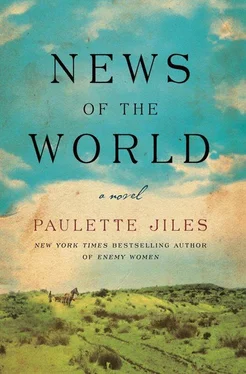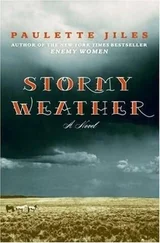He called softly, Johanna, Johanna.
Kep-den!
She jumped out of the wagon bed, throwing aside her blankets in a dramatic gesture. She was in her nightgown with hay in her hair and a looping tangle of fabrics and textiles in her hands. Looka here, y’all, she said.
The Captain turned to her with a smile. She had not yet distinguished the second person plural from the singular but every day saw an improvement.
Shhh, he said. What?
I dress-a, I chekkit, I drawers, I stokkin! Kep-den, look! She held out a bar of soap.
Shhh, yes, excellent. Who gave you this?
She laid all her secondhand clothes in a neat pile on the tailgate and gazed at them happily. Bad water lady, she said.
Good, good, now go dress, we have to leave.
So the young woman who tried to drag Johanna from the Bosque had been stricken with Christian conscience and had collected clothing for the girl; a dress in yellow and madder carriage check, a jacket of dark green, drawers, stockings, and soap. He ran the hems and edges through his fingers, looked at all the buttons; sewed secure and tight. Clothing was hard to come by and these were all of top quality. Good. Stricken consciences are an excellent thing, all told. The girl now had three dresses and plenty of underthings. She would not have to meet her relatives dirty and ill-clad. The thought gave him a small, sharp pain in his heart.
The rainstorm had all but passed over. Now the sky was clearing. He put the horse’s hobbles in his old chore coat pocket and in the stave-mill yard he backed Fancy between the shafts and threw the harness over her back. The gold letters shone in the moonlight.
Johanna ducked into the shed row and came carrying, at the last, something wrapped in burlap but the Captain was too hurried to think about it and so blew out the candle lantern, stepped up to the driver’s seat, turned the little roan mare and the light spring wagon with its screeching fifth wheel. They moved quietly out of arguing, fighting, contentious Durand and into the dark of an early spring Texas night while overhead nightjars moved and sang their low and throaty songs. They swept low, like owls, and carried the light of the stars on their backs. On down the white moonlit road at a steady trot, seven miles an hour, bang bang bang, Pasha trotting behind, eleven at night when all decent folks were in bed. The Captain was not sure what came next, what town, what county, what new trouble.
Johanna climbed over the backrest and took up the burlap bundle and returned to the driver’s seat beside the Captain. She sat beside him and opened it.
Blek-fass! she cried.
Oh no, Johanna, no.
Two chicken carcasses with bloody feathers and no heads lay in her lap. It was Penelope and Amelia. Dead. Deader than John Wilkes Booth. She smiled down at them. She had twisted their heads off and gutted them and out of the cavity of one she held up the quivering blob of an unlaid egg which she had saved out of the entrails.
Is good! she said. She patted his arm with a sticky hand. Blek-fass.
He drove for a few moments with his eyes shut.
It was too late to go back and pay the disagreeable broom man. Too late to apologize, too late to leave money to reimburse the peevish creature. The Captain was now probably thought of in Durand not only as a Davis man but a common chicken thief. He was not sure which was worse. The Captain’s hand went to his forehead. A dreadful loss of status in the world. In his world. Loss of reputation and the regard of our fellow persons is in any society, from Iceland to Malaysia, a terrible blow to the spirit. It is worse than being penniless and more cutting than the blades of enemies.
The Captain said, in an even voice, into which he managed to inject a tone of delight, Indeed! Clever child! Now we have breakfast.
The night was cold and he felt it in his bones and the cool streaks on his cheeks. He realized they were tears, for the trouble that lay ahead of her. For all the years of roofs and walls and the peculiar rules against stealing chickens. He was still tired. He was still drained. She was busy wrapping up the carcasses and singing. She had not the slightest notion of animals as private property, except for horses. Horses belonged to one person, everything else was dinner at large. She would not hesitate to put a bullet through a calf or a kid. In his imagination he saw her walking into the Leonberger yard triumphantly dragging a headless prize foal to please her stranger relatives.
She raised her head and saw him shouldering away the tears on his cheeks.
Oh Kep-dun, she said in a falling tone. She reached up and stroked away the tears with her hard and callused fingertips. Her fingers were gummy with blood and there were down feathers stuck on them. One drifted down in the moonlight like a falling minute angel onto his coat.
Leave me alone, Johanna.
Hungli, she said in a decisive tone. Kontah hungli.
Grandfather was hungry, that was what was wrong, he was hungry and she would soon have him fixed up with roasted chicken with an egg cooked in the rib cage.
He said, Old people cry easily, my dear. One of the afflictions of age.
You-all hungli. She patted the hen’s corpse with a hearty feathered sound. Is all lite Cho-henna?
Yes, he said. It’s all right.
THEY WENT DOWN the road, which was now the Lampasas Road with Durand somewhere behind them, and the sun came up bloody red in a clearing sky. The country was high and flat with only an occasional shift in the landscape. They were exposed. They were the only thing moving in all that horizontal world. They came to Cranfills Gap and stayed the night on the Leon River at a campsite that looked as if it were frequented by convoys of freight wagons. He hoped some would pull in so he could ask for news of Britt but none came, there were only the deep narrow tire tracks and flat spaces in the dirt where somebody had thrown out a bucket of dishwater, a dead campfire. They turned the horses out to find what new grass they could, though the freighters’ teams had nearly eaten it all up.
There he had his roasted chicken and slept heavily. He dreamed of an armed man in the shadows that had about him some terrible noxious smell, and then the man was rising out of the Leon River, amphibious and not entirely human. The Captain sat upright and grasped the coat where his revolver was wrapped but waited it out. This always happened to him when there had been some conflict. First on the Brazos and then Durand. The dreams had just caught up with him now. He knew them of old. Maria Luisa had learned to slide out of bed and stand several feet away and say, over and over, Jeff. Jeff. Querido. Jeff. And he would come out of an intensely real dream where he was fighting for his life, sometimes at Resaca, sometimes on the Tallapoosa, sometimes in broken streets that appeared to be a bombed city with house-to-house fighting as it had been in Monterrey.
Perhaps it was something like this that changed the captive children forever; the violence they had endured when they were captured, their parents killed. Perhaps it sank down in their young minds and stayed there, invisible and unacknowledged but very powerful.
He had no one to awaken him now in a soft voice. He let go of his rolled coat and closed his eyes and quieted himself and lay back down and slept again.
All the next day they stayed in camp and he slept most of it away under the awning. Then they drove into Cranfills Gap with its one store and bought supplies and a little twenty-five-gallon water butt, filled it and went on.
They made twenty miles the next day, a very commendable day’s travel. It was because the road was flat and the surface of a good sandy consistency and Fancy was well-rested. The Captain felt much better. Their English lessons continued. She could now count to a hundred and lace her shoes, when he could convince her to wear them, and sing the first verse of “Hard Times.” She could tell the hour and the minute hands on his watch. She was full of roast chicken and energy. Time, Kontah ! Is time, is time. She stood up on the driver’s seat and did the Rabbit Dance, the Kiowa children’s dance, and when he finally told her to quit it, she jumped down and ran alongside and found the lid of a tin of salve with a bee impressed on it and so made buzzing noises as she flew it up and down.
Читать дальше












